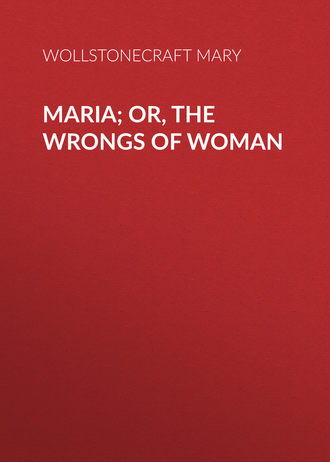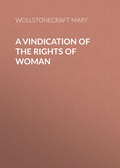
Wollstonecraft Mary
Maria; Or, The Wrongs of Woman
CHAPTER 8
“I HAVE perhaps dwelt too long on a circumstance, which is only of importance as it marks the progress of a deception that has been so fatal to my peace; and introduces to your notice a poor girl, whom, intending to serve, I led to ruin. Still it is probable that I was not entirely the victim of mistake; and that your father, gradually fashioned by the world, did not quickly become what I hesitate to call him—out of respect to my daughter.
“But, to hasten to the more busy scenes of my life. Mr. Venables and my mother died the same summer; and, wholly engrossed by my attention to her, I thought of little else. The neglect of her darling, my brother Robert, had a violent effect on her weakened mind; for, though boys may be reckoned the pillars of the house without doors, girls are often the only comfort within. They but too frequently waste their health and spirits attending a dying parent, who leaves them in comparative poverty. After closing, with filial piety, a father’s eyes, they are chased from the paternal roof, to make room for the first-born, the son, who is to carry the empty family-name down to posterity; though, occupied with his own pleasures, he scarcely thought of discharging, in the decline of his parent’s life, the debt contracted in his childhood. My mother’s conduct led me to make these reflections. Great as was the fatigue I endured, and the affection my unceasing solicitude evinced, of which my mother seemed perfectly sensible, still, when my brother, whom I could hardly persuade to remain a quarter of an hour in her chamber, was with her alone, a short time before her death, she gave him a little hoard, which she had been some years accumulating.
“During my mother’s illness, I was obliged to manage my father’s temper, who, from the lingering nature of her malady, began to imagine that it was merely fancy. At this period, an artful kind of upper servant attracted my father’s attention, and the neighbours made many remarks on the finery, not honestly got, exhibited at evening service. But I was too much occupied with my mother to observe any change in her dress or behaviour, or to listen to the whisper of scandal.
“I shall not dwell on the death-bed scene, lively as is the remembrance, or on the emotion produced by the last grasp of my mother’s cold hand; when blessing me, she added, ‘A little patience, and all will be over!’ Ah! my child, how often have those words rung mournfully in my ears—and I have exclaimed—‘A little more patience, and I too shall be at rest!’
“My father was violently affected by her death, recollected instances of his unkindness, and wept like a child.
“My mother had solemnly recommended my sisters to my care, and bid me be a mother to them. They, indeed, became more dear to me as they became more forlorn; for, during my mother’s illness, I discovered the ruined state of my father’s circumstances, and that he had only been able to keep up appearances, by the sums which he borrowed of my uncle.
“My father’s grief, and consequent tenderness to his children, quickly abated, the house grew still more gloomy or riotous; and my refuge from care was again at Mr. Venables’; the young ‘squire having taken his father’s place, and allowing, for the present, his sister to preside at his table. George, though dissatisfied with his portion of the fortune, which had till lately been all in trade, visited the family as usual. He was now full of speculations in trade, and his brow became clouded by care. He seemed to relax in his attention to me, when the presence of my uncle gave a new turn to his behaviour. I was too unsuspecting, too disinterested, to trace these changes to their source.
“My home every day became more and more disagreeable to me; my liberty was unnecessarily abridged, and my books, on the pretext that they made me idle, taken from me. My father’s mistress was with child, and he, doating on her, allowed or overlooked her vulgar manner of tyrannizing over us. I was indignant, especially when I saw her endeavouring to attract, shall I say seduce? my younger brother. By allowing women but one way of rising in the world, the fostering the libertinism of men, society makes monsters of them, and then their ignoble vices are brought forward as a proof of inferiority of intellect.
“The wearisomeness of my situation can scarcely be described. Though my life had not passed in the most even tenour with my mother, it was paradise to that I was destined to endure with my father’s mistress, jealous of her illegitimate authority. My father’s former occasional tenderness, in spite of his violence of temper, had been soothing to me; but now he only met me with reproofs or portentous frowns. The house-keeper, as she was now termed, was the vulgar despot of the family; and assuming the new character of a fine lady, she could never forgive the contempt which was sometimes visible in my countenance, when she uttered with pomposity her bad English, or affected to be well bred.
“To my uncle I ventured to open my heart; and he, with his wonted benevolence, began to consider in what manner he could extricate me out of my present irksome situation. In spite of his own disappointment, or, most probably, actuated by the feelings that had been petrified, not cooled, in all their sanguine fervour, like a boiling torrent of lava suddenly dash ing into the sea, he thought a marriage of mutual inclination (would envious stars permit it) the only chance for happiness in this disastrous world. George Venables had the reputation of being attentive to business, and my father’s example gave great weight to this circumstance; for habits of order in business would, he conceived, extend to the regulation of the affections in domestic life. George seldom spoke in my uncle’s company, except to utter a short, judicious question, or to make a pertinent remark, with all due deference to his superior judgment; so that my uncle seldom left his company without observing, that the young man had more in him than people supposed.
“In this opinion he was not singular; yet, believe me, and I am not swayed by resentment, these speeches so justly poized, this silent deference, when the animal spirits of other young people were throwing off youthful ebullitions, were not the effect of thought or humility, but sheer barrenness of mind, and want of imagination. A colt of mettle will curvet and shew his paces. Yes; my dear girl, these prudent young men want all the fire necessary to ferment their faculties, and are characterized as wise, only because they are not foolish. It is true, that George was by no means so great a favourite of mine as during the first year of our acquaintance; still, as he often coincided in opinion with me, and echoed my sentiments; and having myself no other attachment, I heard with pleasure my uncle’s proposal; but thought more of obtaining my freedom, than of my lover. But, when George, seemingly anxious for my happiness, pressed me to quit my present painful situation, my heart swelled with gratitude—I knew not that my uncle had promised him five thousand pounds.
“Had this truly generous man mentioned his intention to me, I should have insisted on a thousand pounds being settled on each of my sisters; George would have contested; I should have seen his selfish soul; and—gracious God! have been spared the misery of discovering, when too late, that I was united to a heartless, unprincipled wretch. All my schemes of usefulness would not then have been blasted. The tenderness of my heart would not have heated my imagination with visions of the ineffable delight of happy love; nor would the sweet duty of a mother have been so cruelly interrupted.
“But I must not suffer the fortitude I have so hardly acquired, to be undermined by unavailing regret. Let me hasten forward to describe the turbid stream in which I had to wade—but let me exultingly declare that it is passed—my soul holds fellowship with him no more. He cut the Gordian knot, which my principles, mistaken ones, respected; he dissolved the tie, the fetters rather, that ate into my very vitals—and I should rejoice, conscious that my mind is freed, though confined in hell itself, the only place that even fancy can imagine more dreadful than my present abode.
“These varying emotions will not allow me to proceed. I heave sigh after sigh; yet my heart is still oppressed. For what am I reserved? Why was I not born a man, or why was I born at all?”
CHAPTER 9
“I RESUME my pen to fly from thought. I was married; and we hastened to London. I had purposed taking one of my sisters with me; for a strong motive for marrying, was the desire of having a home at which I could receive them, now their own grew so uncomfortable, as not to deserve the cheering appellation. An objection was made to her accompanying me, that appeared plausible; and I reluctantly acquiesced. I was however willingly allowed to take with me Molly, poor Peggy’s daughter. London and preferment, are ideas commonly associated in the country; and, as blooming as May, she bade adieu to Peggy with weeping eyes. I did not even feel hurt at the refusal in relation to my sister, till hearing what my uncle had done for me, I had the simplicity to request, speaking with warmth of their situation, that he would give them a thousand pounds a-piece, which seemed to me but justice. He asked me, giving me a kiss, ‘If I had lost my senses?’ I started back, as if I had found a wasp in a rose-bush. I expostulated. He sneered: and the demon of discord entered our paradise, to poison with his pestiferous breath every opening joy.
“I had sometimes observed defects in my husband’s understanding; but, led astray by a prevailing opinion, that goodness of disposition is of the first importance in the relative situations of life, in proportion as I perceived the narrowness of his understanding, fancy enlarged the boundary of his heart. Fatal error! How quickly is the so much vaunted milkiness of nature turned into gall, by an intercourse with the world, if more generous juices do not sustain the vital source of virtue!
“One trait in my character was extreme credulity; but, when my eyes were once opened, I saw but too clearly all I had before overlooked. My husband was sunk in my esteem; still there are youthful emotions, which, for a while, fill up the chasm of love and friendship. Besides, it required some time to enable me to see his whole character in a just light, or rather to allow it to become fixed. While circumstances were ripening my faculties, and cultivating my taste, commerce and gross relaxations were shutting his against any possibility of improvement, till, by stifling every spark of virtue in himself, he began to imagine that it no where existed.
“Do not let me lead you astray, my child, I do not mean to assert, that any human being is entirely incapable of feeling the generous emotions, which are the foundation of every true principle of virtue; but they are frequently, I fear, so feeble, that, like the inflammable quality which more or less lurks in all bodies, they often lie for ever dormant; the circumstances never occurring, necessary to call them into action.
“I discovered however by chance, that, in consequence of some losses in trade, the natural effect of his gambling desire to start suddenly into riches, the five thousand pounds given me by my uncle, had been paid very opportunely. This discovery, strange as you may think the assertion, gave me pleasure; my husband’s embarrassments endeared him to me. I was glad to find an excuse for his conduct to my sisters, and my mind became calmer.
“My uncle introduced me to some literary society; and the theatres were a never-failing source of amusement to me. My delighted eye followed Mrs. Siddons, when, with dignified delicacy, she played Califta; and I involuntarily repeated after her, in the same tone, and with a long-drawn sigh,
‘Hearts like our’s were pair’d—not match’d.’
“These were, at first, spontaneous emotions, though, becoming acquainted with men of wit and polished manners, I could not sometimes help regretting my early marriage; and that, in my haste to escape from a temporary dependence, and expand my newly fledged wings, in an unknown sky, I had been caught in a trap, and caged for life. Still the novelty of London, and the attentive fondness of my husband, for he had some personal regard for me, made several months glide away. Yet, not forgetting the situation of my sisters, who were still very young, I prevailed on my uncle to settle a thousand pounds on each; and to place them in a school near town, where I could frequently visit, as well as have them at home with me.
“I now tried to improve my husband’s taste, but we had few subjects in common; indeed he soon appeared to have little relish for my society, unless he was hinting to me the use he could make of my uncle’s wealth. When we had company, I was disgusted by an ostentatious display of riches, and I have often quitted the room, to avoid listening to exaggerated tales of money obtained by lucky hits.
“With all my attention and affectionate interest, I perceived that I could not become the friend or confident of my husband. Every thing I learned relative to his affairs I gathered up by accident; and I vainly endeavoured to establish, at our fire-side, that social converse, which often renders people of different characters dear to each other. Returning from the theatre, or any amusing party, I frequently began to relate what I had seen and highly relished; but with sullen taciturnity he soon silenced me. I seemed therefore gradually to lose, in his society, the soul, the energies of which had just been in action. To such a degree, in fact, did his cold, reserved manner affect me, that, after spending some days with him alone, I have imagined myself the most stupid creature in the world, till the abilities of some casual visitor convinced me that I had some dormant animation, and sentiments above the dust in which I had been groveling. The very countenance of my husband changed; his complexion became sallow, and all the charms of youth were vanishing with its vivacity.
“I give you one view of the subject; but these experiments and alterations took up the space of five years; during which period, I had most reluctantly extorted several sums from my uncle, to save my husband, to use his own words, from destruction. At first it was to prevent bills being noted, to the injury of his credit; then to bail him; and afterwards to prevent an execution from entering the house. I began at last to conclude, that he would have made more exertions of his own to extricate himself, had he not relied on mine, cruel as was the task he imposed on me; and I firmly determined that I would make use of no more pretexts.
“From the moment I pronounced this determination, indifference on his part was changed into rudeness, or something worse.
“He now seldom dined at home, and continually returned at a late hour, drunk, to bed. I retired to another apartment; I was glad, I own, to escape from his; for personal intimacy without affection, seemed, to me the most degrading, as well as the most painful state in which a woman of any taste, not to speak of the peculiar delicacy of fostered sensibility, could be placed. But my husband’s fondness for women was of the grossest kind, and imagination was so wholly out of the question, as to render his indulgences of this sort entirely promiscuous, and of the most brutal nature. My health suffered, before my heart was entirely estranged by the loathsome information; could I then have returned to his sullied arms, but as a victim to the prejudices of mankind, who have made women the property of their husbands? I discovered even, by his conversation, when intoxicated that his favourites were wantons of the lowest class, who could by their vulgar, indecent mirth, which he called nature, rouse his sluggish spirits. Meretricious ornaments and manners were necessary to attract his attention. He seldom looked twice at a modest woman, and sat silent in their company; and the charms of youth and beauty had not the slightest effect on his senses, unless the possessors were initiated in vice. His intimacy with profligate women, and his habits of thinking, gave him a contempt for female endowments; and he would repeat, when wine had loosed his tongue, most of the common-place sarcasms levelled at them, by men who do not allow them to have minds, because mind would be an impediment to gross enjoyment. Men who are inferior to their fellow men, are always most anxious to establish their superiority over women. But where are these reflections leading me?
“Women who have lost their husband’s affection, are justly reproved for neglecting their persons, and not taking the same pains to keep, as to gain a heart; but who thinks of giving the same advice to men, though women are continually stigmatized for being attached to fops; and from the nature of their education, are more susceptible of disgust? Yet why a woman should be expected to endure a sloven, with more patience than a man, and magnanimously to govern herself, I cannot conceive; unless it be supposed arrogant in her to look for respect as well as a maintenance. It is not easy to be pleased, because, after promising to love, in different circumstances, we are told that it is our duty. I cannot, I am sure (though, when attending the sick, I never felt disgust) forget my own sensations, when rising with health and spirit, and after scenting the sweet morning, I have met my husband at the breakfast table. The active attention I had been giving to domestic regulations, which were generally settled before he rose, or a walk, gave a glow to my countenance, that contrasted with his squallid appearance. The squeamishness of stomach alone, produced by the last night’s intemperance, which he took no pains to conceal, destroyed my appetite. I think I now see him lolling in an arm-chair, in a dirty powdering gown, soiled linen, ungartered stockings, and tangled hair, yawning and stretching himself. The newspaper was immediately called for, if not brought in on the tea-board, from which he would scarcely lift his eyes while I poured out the tea, excepting to ask for some brandy to put into it, or to declare that he could not eat. In answer to any question, in his best humour, it was a drawling ‘What do you say, child?’ But if I demanded money for the house expences, which I put off till the last moment, his customary reply, often prefaced with an oath, was, ‘Do you think me, madam, made of money?’—The butcher, the baker, must wait; and, what was worse, I was often obliged to witness his surly dismission of tradesmen, who were in want of their money, and whom I sometimes paid with the presents my uncle gave me for my own use.
“At this juncture my father’s mistress, by terrifying his conscience, prevailed on him to marry her; he was already become a methodist; and my brother, who now practised for himself, had discovered a flaw in the settlement made on my mother’s children, which set it aside, and he allowed my father, whose distress made him submit to any thing, a tithe of his own, or rather our fortune.
“My sisters had left school, but were unable to endure home, which my father’s wife rendered as disagreeable as possible, to get rid of girls whom she regarded as spies on her conduct. They were accomplished, yet you can (may you never be reduced to the same destitute state!) scarcely conceive the trouble I had to place them in the situation of governesses, the only one in which even a well-educated woman, with more than ordinary talents, can struggle for a subsistence; and even this is a dependence next to menial. Is it then surprising, that so many forlorn women, with human passions and feelings, take refuge in infamy? Alone in large mansions, I say alone, because they had no companions with whom they could converse on equal terms, or from whom they could expect the endearments of affection, they grew melancholy, and the sound of joy made them sad; and the youngest, having a more delicate frame, fell into a decline. It was with great difficulty that I, who now almost supported the house by loans from my uncle, could prevail on the master of it, to allow her a room to die in. I watched her sick bed for some months, and then closed her eyes, gentle spirit! for ever. She was pretty, with very engaging manners; yet had never an opportunity to marry, excepting to a very old man. She had abilities sufficient to have shone in any profession, had there been any professions for women, though she shrunk at the name of milliner or mantua-maker as degrading to a gentlewoman. I would not term this feeling false pride to any one but you, my child, whom I fondly hope to see (yes; I will indulge the hope for a moment!) possessed of that energy of character which gives dignity to any station; and with that clear, firm spirit that will enable you to choose a situation for yourself, or submit to be classed in the lowest, if it be the only one in which you can be the mistress of your own actions.
“Soon after the death of my sister, an incident occurred, to prove to me that the heart of a libertine is dead to natural affection; and to convince me, that the being who has appeared all tenderness, to gratify a selfish passion, is as regardless of the innocent fruit of it, as of the object, when the fit is over. I had casually observed an old, meanlooking woman, who called on my husband every two or three months to receive some money. One day entering the passage of his little counting-house, as she was going out, I heard her say, ‘The child is very weak; she cannot live long, she will soon die out of your way, so you need not grudge her a little physic.’
“‘So much the better,’ he replied,’ and pray mind your own business, good woman.’
“I was struck by his unfeeling, inhuman tone of voice, and drew back, determined when the woman came again, to try to speak to her, not out of curiosity, I had heard enough, but with the hope of being useful to a poor, outcast girl.
“A month or two elapsed before I saw this woman again; and then she had a child in her hand that tottered along, scarcely able to sustain her own weight. They were going away, to return at the hour Mr. Venables was expected; he was now from home. I desired the woman to walk into the parlour. She hesitated, yet obeyed. I assured her that I should not mention to my husband (the word seemed to weigh on my respiration), that I had seen her, or his child. The woman stared at me with astonishment; and I turned my eyes on the squalid object [that accompanied her.] She could hardly support herself, her complexion was sallow, and her eyes inflamed, with an indescribable look of cunning, mixed with the wrinkles produced by the peevishness of pain.
“Poor child!’ I exclaimed. ‘Ah! you may well say poor child,’ replied the woman. ‘I brought her here to see whether he would have the heart to look at her, and not get some advice. I do not know what they deserve who nursed her. Why, her legs bent under her like a bow when she came to me, and she has never been well since; but, if they were no better paid than I am, it is not to be wondered at, sure enough.’
“On further enquiry I was informed, that this miserable spectacle was the daughter of a servant, a country girl, who caught Mr. Venables’ eye, and whom he seduced. On his marriage he sent her away, her situation being too visible. After her delivery, she was thrown on the town; and died in an hospital within the year. The babe was sent to a parish-nurse, and afterwards to this woman, who did not seem much better; but what was to be expected from such a close bargain? She was only paid three shillings a week for board and washing.
“The woman begged me to give her some old clothes for the child, assuring me, that she was almost afraid to ask master for money to buy even a pair of shoes.
“I grew sick at heart. And, fearing Mr. Venables might enter, and oblige me to express my abhorrence, I hastily enquired where she lived, promised to pay her two shillings a week more, and to call on her in a day or two; putting a trifle into her hand as a proof of my good intention.
“If the state of this child affected me, what were my feelings at a discovery I made respecting Peggy—?” 7






